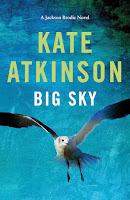In the years since Started Early, Took My Dog, time has moved on and yet little has changed for Jackson Brodie. He's still a private investigator, still haunted by the murder of his sister which compels his efforts to find and save other missing women. And yet his caseload is all sweating small stuff: following a married man and his girlfriend on dates; doing background research on some people; running round after his ex and their now-teenage son.
Lots of it involves people we've met before: that ex, Julia, is from the first book and she's been a constant presence. There's the return of Reggie Chase from book three, now working in the police but denying that's down to Jackson. We call back to events and people from previous adventures, because part of the thing is that Jackson lives in the past, but also trauma lasts for a lifetime. In addition, there's a more meta textual thing going on. Julia plays a pathologist in a TV series about a police detective, and at one point a cast member asking Jackson's advice for a scene. Then there's Jackson's continued reference to his own "little grey cells", linking him to Poirot (just as, a few sentences before introducing us to Poirot, Agatha Christie mentioned Sherlock Holmes). It's Jackson, and this whole endeavour, as part of a continuum, of death as entertainment.
To be honest, death takes quite a time to put in an appearance. Nothing much happens for a good few hours of the audiobook - we trail after Jackson and other characters going about their various lives, some of which intersect. But there are hints of something darker under the surface and as we pick over details, Jackson's instincts are shown to be absolutely, horribly right. There are a lot of women in danger...
I found the first half of the book mostly fun if a little too on the nose - anyone in favour of Brexit is crass and a bit (or a lot) racist, and there's lots of Jackson being grumpy about modern life. A running gag is that we get a character's train of thought and then someone else telling them to get a move on or to focus on matters at hand, as if the characters are sniping at their author's flights of fancy. As I said of the previous novel, this kind of thing can all feel a bit self-indulgent. But I think it's works better in this case, not least because this groundwork binds us to the various characters before the plot kicks into gear and things get properly thrilling and tense.
What follows is often brutal - children in danger, some horrible deaths, and a seemingly endemic violence against women and girls. Atkinson has lots to say on the subject, but woven through the novel and from various perspectives so it never feels like a lecture. It is harrowing and compelling.
That makes it sound like an angry novel, and it is in places. Yet it's also often funny, and the over-riding emotion is melancholy - for lives lost and blighted, for the harm done by callousness and greed, for the long shadow it all casts over everything.
In that, and in its thrilling tension and it feeling like it had something to say, it chimed with No Time To Die, which I went to see on Saturday and really liked - but want to see again before committing my little grey cells.








No comments:
Post a Comment